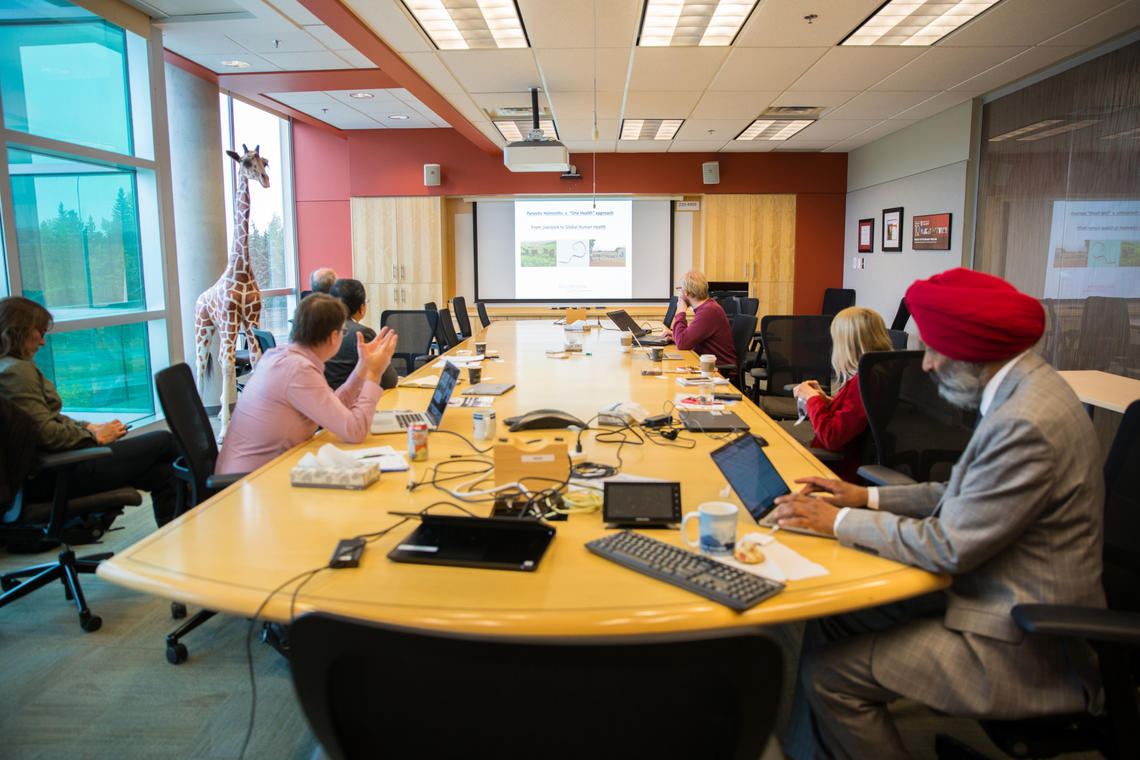Oct. 2, 2017
Gates Foundation interested in 'One Health' research approach at UCalgary

An expert in livestock and agricultural development at the Bill and Melinda Gates Foundation says the faculties of medicine and veterinary medicine at the University of Calgary “are true practitioners of One Health.”
“They are ‘walking the talk’, which is unique in my experience,” says Dr. Samuel Thevasagayam, head of livestock and deputy director of agriculture development at the Gates Foundation in Seattle, Washington. He oversees implementation of the Foundation’s strategy in animal health, animal production and livestock systems.
Thevasagaym spent the day recently with researchers at the Faculty of Veterinary Medicine (UCVM) and the Cumming School of Medicine.
“Typically, veterinarians talk a lot about One Health, with little traction from the medical professionals. What I saw in Calgary was best in its kind where MDs, DVMs and PhDs were equally motivated by addressing societal needs through the One Health lens.”
Thevasagaym heard presentations from several researchers. He says quite a few projects are relevant to the work that the Gates Foundation is involved in.
“The gastrointestinal parasite program, strengthening veterinary services in Bhutan, the work in Vietnam and Tanzania are complementary to some of our efforts at the Foundation,” he says. “All these programs, including the interesting work in the Canadian Arctic, highlighted some very relevant and important learnings for the work we do.
“I hope to follow up on some of these and see how best we could collaborate with the University of Calgary.”

Researchers gather to present their international research projects to Dr. Thevasagayam.
Riley Brandt, University of Calgary
Using expertise in livestock parasite research to help infected people
Dr. John Gilleard, professor at UCVM and expert in parasitology, has recently received funding from the Gates Foundation to work on soil- transmitted helminths (roundworms) in people. These are roundworm parasites, such as hookworms, that infect more than a billion people across the world, mainly in developing countries. Mass drug administration programs — treating all school-aged children in the community — have increased greatly over the last 20 years as part of efforts to reduce the disease burden. But with only one class of drug available that works on these parasites, there are growing concerns about the emergence of drug resistance. Gilleard is now using his expertise in similar parasites in sheep and cattle to study soil-transmitted helminths in humans.
“Because of the research on livestock we know which mutations in the genome are likely to be responsible for resistance in these kinds of parasites to that particular drug class,” says Gilleard. “We’re going to go look for those specific mutations in the parasite genomes in these communities. So, if they’re there it suggests drug resistant parasites are emerging.
“It’s the first time we’ve applied these approaches to human parasites and these are initial funds to get that project going.”

Susan Cork, David Hall, Susan Kutz, Guido van Marle, Sam Thevasagayam, John Gilleard, Baljit Singh.
Riley Brandt, University of Calgary
From Australia to Calgary via Seattle
The day-long visit came about after Thevasagayam and Dr. Baljit Singh, dean of UCVM, met at a conference last year in Australia.
“It was his way of conveying his desire to assist the Foundation’s mission as an expert in his field and as a leader of an institution that attracted me to visit,” explains Thevasagaym. “I am so privileged to meet great people around the world in my current role. That meeting with Professor Singh was special and I wanted to make sure I had the opportunity to spend time at Calgary to learn more and explore alignment of our respective efforts in International Development.”
“I wanted to showcase our international programs to the Gates Foundation and to seek opportunities to work with them,” says Singh.
“Our relationship with the Foundation is really important because they are also looking into the connection between livestock and human health and poverty alleviation in developing countries. Tackling the critical and complex issues facing animals, humans and the environment in Canada and abroad takes a One Health approach.”
